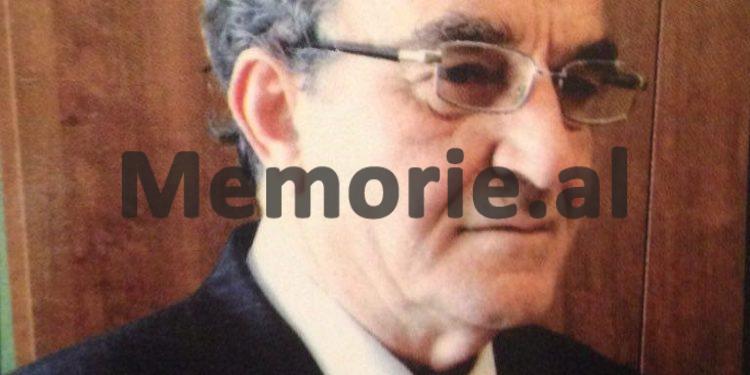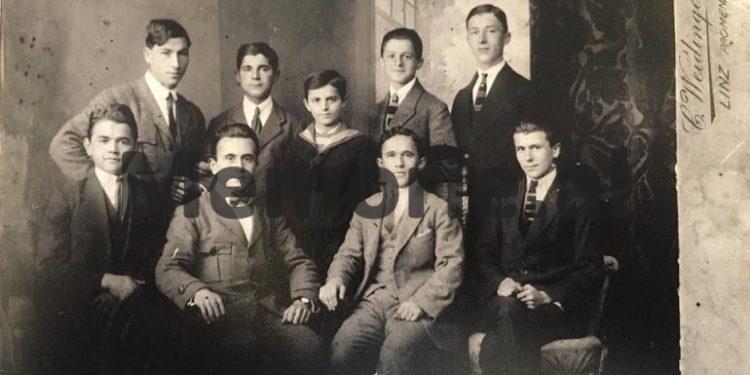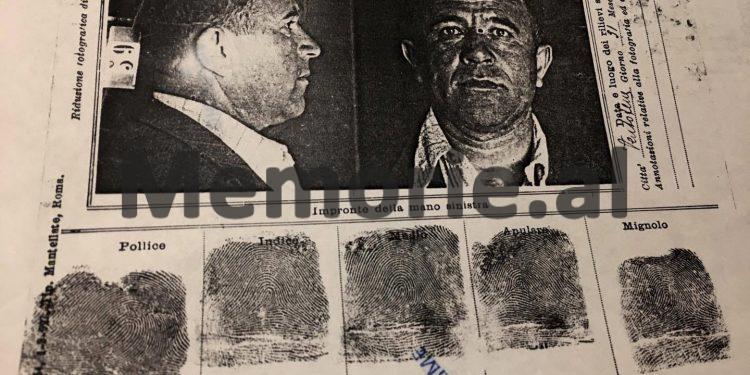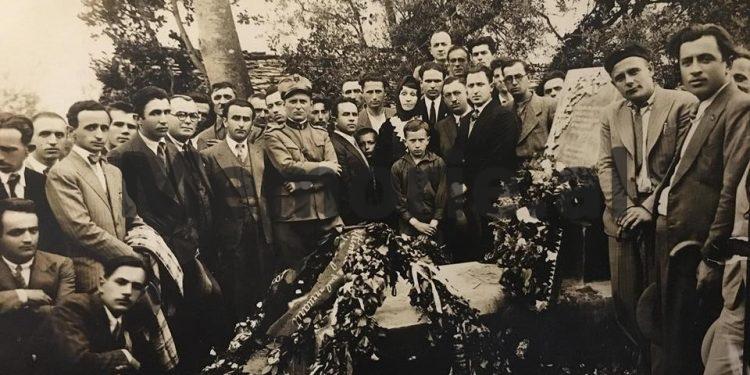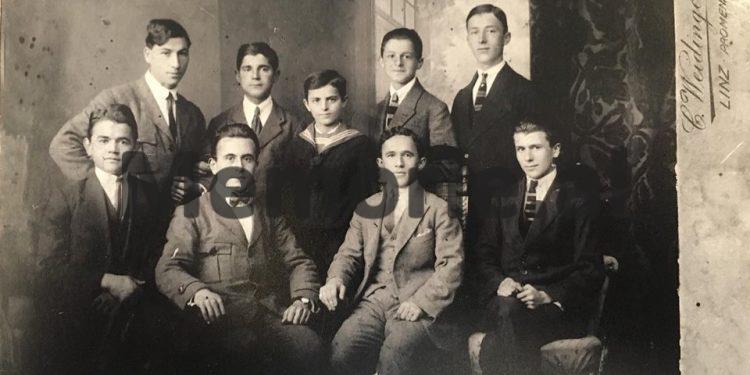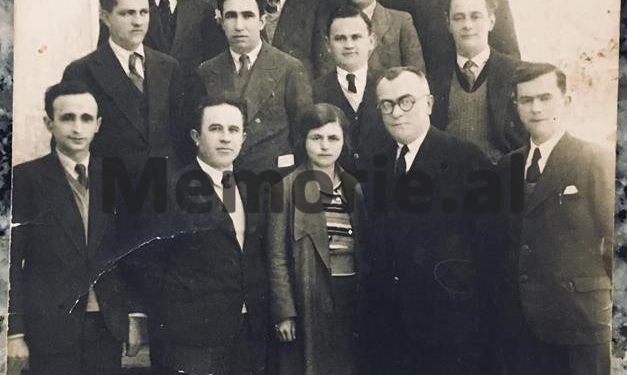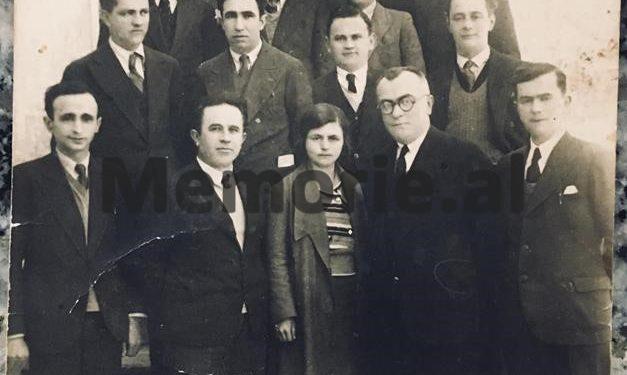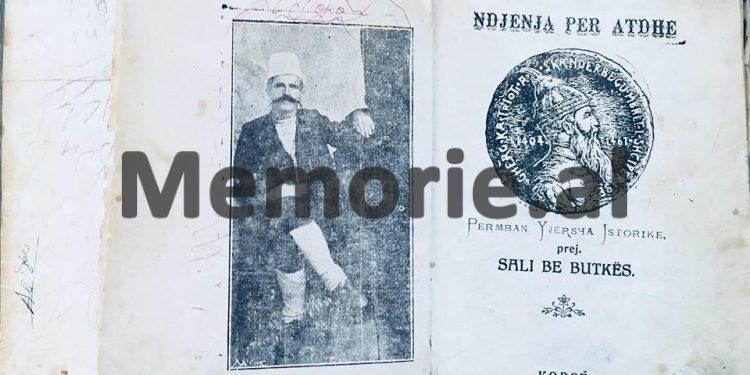Dashnor Kaloçi
Memorie.al/ publishes the unknown story of the Butka family with early origin from the village of Frashër i Dangëllisë, who later settled in Butkë and Orgockë of Kolonjë, where their first was Sali Butka, who was initially known as Sali Tahir Aliçka. Rare testimonies of Uran Butka, one of the most famous suckers of this large and famous family in the history of Albania, who is known as: historian, researcher, publicist, writer, painter, politician and former MP, being a by well-known public figures of post-1990s Albania. The stories of Mr. Butka, for the patriotic activity for the benefit of the Albanian cause of his grandfather, otherwise known as the Elder of Butka, a renaissance nourished by the works of Sami, Naim, Jani Vretos, etc., who became a propagator of the Renaissance culture, books, Albanian press and schools in Kolonjë and Korçë, where together with Petro Nini Luarasi and Jani Cico Kosturi, in the years 1893-1895, they opened 5 Albanian schools in Kolonjë. How did he protect them from the Turkish government and the Greek Patriarchate, Sali Butka’s rifle, while Saliu himself, secretly brought from Bitola, Albanian books for the first Albanian schools. The unknown story of his son, Safet, from graduating in Vienna, Austria in the period of the Zog Monarchy and then one of the main leaders of the nationalist organization Balli Kombëtar during the period of occupation (1939-1944), who sacrificed his life to stop the fratricide between partisan and nationalist communist forces, and to the persecution of the Butka family during the period of Enver Hoxha’s communist regime.
Historian, researcher, publicist, writer, painter, politician and former MP, Uran Butka, one of the most well-known public figures after the 1990s, despite holding eight decades on the shoulders of his life, continues to work again , even with tremendous energy, as if seeking to challenge not only his age, but also all that dark period of time for him, before the 1990s, when the communist regime had deprived him of the right to write, studies and books, of which he says will be his inseparable companion for the rest of his life, as long as he has a living spirit. Immersed in books in his work studio, somewhere in the center of the capital near the Lumo Skëndo Institute, which he has been running for a few years, it seems that he has not yet recovered from a job that is very precious to him, and he will we said without exaggeration one of his dreams, that of bringing home the remains of Mit’had Frashëri, his idol and at the same time the leader of Albanian nationalism. Author of many books, such as those with historical studies, but also a deliverer of literature with novels and story books, Uran Butka has almost never spoken or written about his life. This is also one of the reasons that prompted us to meet and conduct this exclusive interview for Memorie.al, (in three consecutive issues), but life with his personal stories, can never be separated from the saga of the Butka family, who have been rightly called as: strong and precious stones in the foundations of Albanian history. So, in this context, are we starting from the roots of this family?
Mr. Uran, what is the Butka family?
According to Sami Frashëri, when the first Frashërllinj settled in Frashër i Dangëllisë, around 1650, they found the autochthonous Alickas there. When Frashëri fell economically, the Alicka family moved to the villages of Butkë and Orgockë in Kolonjë, and later to Kosovo. While the Frashëri family moved to Ioannina and then to Istanbul. My grandfather, Sali Butka, was initially called Sali Tahir Alicka, then, when he became famous in Kolonjë and beyond, he was nicknamed Sali Butka.
What did Sali Butka become famous for?
He was a renaissance nurtured by the works of Sami, Naim, Jani Vretos and others and became a propagator of the Albanian Renaissance culture, books, press and schools in Kolonjë and Korçë, together with Petro Nini Luarasi and Jani Cico Kosturi. In the years 1893-1895 they opened 5 Albanian schools in Kolonjë. Sali Butka’s rifles protected them from the Turkish government and the Greek patriarchate, while Sali Butka brought hidden Albanian books for the first Albanian schools from Bitola. This is how he started his renaissance activity at the end of the 19th century.
What is the role of Sali Butka in the Secret Committee of the Monastery?
Sali Butka became a member of the Secret Committee of the Monastery, which was founded in 1905 headed by the patriot Bajo Topulli. The decision of this committee was to create the first insurgent groups. Bajo Topulli went to Sali Butka’s house in December 1905 and in January 1906 the first national squad was founded in Butka. In 1907, the detachment of Çerçiz Topulli and Mihal Grameno went there, who gave the movement for freedom, important development and prepared the convening of the Congress of Manastir in 1908, led by Mid’hat Frashëri, a congress that defined the Latin alphabet and the opening of Albanian schools. Sali Butka immediately adopted this alphabet and the poems and writings published in “Kalendari Kombiar”, the newspaper “Liria e Shqipërisë” etc., published them with this unified ABECE. When the Young Turks began to close Albanian schools and clubs and demanded the use of the Arabic-Turkish alphabet, Sali Butka with 2,500 colonists marched to Korça, where a “Rally of Albanian letters” of 10,000 people took place, who opposed the foreign alphabet and defended the alphabet. Monastery. Saliu was persecuted and imprisoned several times by the Turkish government, but did not give up. In 1911 he expanded his liberation squad. In May 1912, more than 50 colonists participated in the Junik Assembly, near Peja in Kosovo, which decided to launch a general uprising. There he met Hasan Prishtina, Isa Boletini, Bajram Curri, with whom he continued the national cooperation. In June 1912, the insurgent committee of Southeastern Albania was organized in Frashër with Commander Sali Butkë.
Was Sali Butka in the declaration of independence of Albania in Vlora, in November 1912?
Before I dwell on this question, I wanted to tell you a little bit about another event. During the trip to Frashër, Sali Butka’s eldest son, Iljazi, was killed in an ambush by Turkish commandos, for whom he did not mourn, he was writing a song: “Our motherland was killed, who was one of my first friends, and an Albanian son the Albanian, his soul and grave are bright”. At the head of the Kolonja gang, Sali Butka liberated Erseka and Korça, in August 1912. In the newspaper “Koha” of August 11, 1912, Mihal Grameno wrote: “The heard patriot Sali Butka, a simple Albanian man with a patriotic heart; his comrades were dressed in national clothes and armed with malierka”. In November 1912 he left with his gang for Vlora, for the declaration of independence, but arrived with a little delay, like Isa Boletini. In Vlora he was received by Ismail Qemali and the government of Vlora and assigned to the Mifol Bridge to protect the new Albanian state from the attack of the Turkish army of Xhavit Pasha, coming from Fier, which he broke and turned back. Meanwhile, Albania was occupied for the most part by the Serbian and Greek armies. At the forefront of the fight against the Greek invaders was Sali Butka with his gang, with his son, Gani Butka and his brother, Myftar Butka. Many battles took place in Kolonjë, Skrapar, Korçë, such as the wars of Shtika, Butka, Qarri, Luarasi, Qesaraka, Backa, Qafë-Marta, Panarit, which defended the entire Albanian front line. In the battle of Nikolica, April 24, 1914, Sali Butka’s army defended Korça from the attack of the Greek army.Ioannina and then to Istanbul. My grandfather, Sali Butka, was initially called Sali Tahir Alicka, then, when he became famous in Kolonjë and beyond, he was nicknamed Sali Butka.
This is the battle where Sali Butka was wounded in the eye?
Yes, exactly in this battle Sali Butka was wounded in the left eye, but he did not withdraw from the battle and saved Korça and its region from the Greek occupation. The Butka family also contributed to the fight against the Hajj rebellion of 1914-1915. The new commander, Gani Butka, Sali Butka’s second son, was killed along with 60 colonists in Pogradec to protect Korça and Pogradec from this anti-national rebellion. Another martyr of the family. Saliu felt great pain for the loss of Gani and wrote about him an elegy, which turned into a song: “Gramoz Mountains cry”.
What is the role of Sali Butka in the period 1914-1918, in the years of the First World War?
When the First World War started, Sali Butka with his troops with the support of the Austro-Hungarians started the fight for liberation from the foreign invaders who had invaded Albania. The culmination of this war was when his troops, which numbered up to 30,000, began to liberate the provinces of Skrapar, Panarit, Gora, Opar, to reach Korca, where the French were. In Voskopoja there were several Greek commandos, which hindered the national forces. Sali Butka sent a letter to the elders, where he wrote: “According to the decisions of the Conference of Ambassadors of London, Gjirokastra and Korça remain with Albania. So, Voskopoja, being an integral part of the Korça region, remains with Albania, therefore, as the leader of the Albanian squads, I am coming to take it over with the hope that you will welcome our arrival “. However, he received this insulting answer: “Mr. Butka, we received your letter and learned that you had decided to come to Voskopoja, I am informing you that you should know that we will never allow it, because it is a pity that with the dirty feet of Albanians to be violated a handful of land from ancient Greek Voskopoja. “We will never accept a flag other than the Greek one, we will defend it to the last drop of our blood.” The war started by the Greek soldiers started. Meanwhile a thief, wanting to profit, set fire to a thatched hut and the fire engulfed the entire village. Sali Butka opened a path and helped all the inhabitants of Voskpopoja to cross to Korça. No Voskopojars were killed or burned. Saliu pursued the arsonist and shot him in court. He then surrounded Korça with his army, together with Themistokli Gërmenji’s forces, and put pressure on the French authority, General Dekoen, to announce the unification of Korça with Albania.
What happened next?
The French invited the two commanders to Korça to talk. Themistokliu in agreement with Saliu went to Korça, while Saliu kept him surrounded. The French generals Dekoen, Sarai, etc., emphasize that it was this military pressure of Sali Butka and the diplomacy of Themistokli Gërmenji, that forced the French to declare the Albanian self-government of the Korça kaza on December 10, 1916 and then its unification with Albania. This was a great historical achievement.
What is the role of Sali Butka in the Congress of Lushnja?
Sali Butka participated in the Congress of Lushnja as the delegate of Kolonja and Korça in 1920. This congress really restored the independence of the Albanian state and introduced it to the democratic developments. Sali Butka delivered a speech on the balcony of the municipality in Lushnja and joined the ranks of democratic forces. At this time, it seemed to Sali that he had fulfilled the purpose of his life. In Korça he published the book of poems “Feeling for the homeland”, “These are historical poems, told point by point, without fear of any fear /, neither from rifles nor from knives”, he writes. However, the development of events and the danger that threatened Albania made Sali Butka unfulfilled. Regarding this, among other things, he writes: “In my old age / I received serious wounds, / because of Albania / which did not happen as I had hoped”. Saliu passed away on October 20, 1938, his grave is in Erseka. He was honored with the “Order of Skanderbeg” and the “Order of Freedom”.
Will we now dwell on your father, Safet Butka, another prominent figure in the Butka family?
Yes, Safet Butka continued his father’s path, but took him even further. He worked and distinguished himself in the field of education and national culture, and then in the fight for freedom. He received his first inspirations from his father and the traditions of Cologne. He completed his secondary education in Graz, Austria and later at the University of Philosophy. There, together with Lazgush Poradec, Krist Maloku, etc., they formed the student society and published the first poetic collection of Naim Frashëri, where the main place was occupied by Safet Butka’s study of the life and work of the national poet. In the same year, (1925) he published this study as a separate book. He also took part in the Vienna student movement, which published the magazines “Djalëria” and “Minerva”, where Safet Butka published his first articles. In Austria he took with him his uncle’s youngest son, Qemal Butka, who their completed primary, secondary and university education in architecture and became one of the most prominent architects of the time in Albania and the USA.
When you returned to Albania, where was your father named Safet?
Safet returned to Albania and was appointed professor at the French Lyceum in Korça, where he taught German and Albanian. Then he was appointed a teacher in the commercial school of Vlora. Petro Marko, his student, writes in “Interview with himself”: “The history teacher was Safet Butka from Cologne. We wanted him to be the son of Sali Butka. He had studied in Austria and taught us thick books and other encyclopedias. He did not associate with Italian professors, he even despised them.
Your father was also in the city of Gjirokastra?
Yes, in the years 1934-’35, the father was appointed director of the Normal School of Gjirokastra, where he distinguished himself as an education reformer. There he founded the first association of teachers in Albania, with which he conducted many cultural activities, such as excursions to get to know the country, placing a memorial plaque on the Mashkullore maple, where Çerçiz Topulli ç ç’s squad fought, commemorating patriotic figures like Koto Hoxhi, Hasan Tahsini et al. Then he was transferred to the Ministry of Education and together with Minister Mirash Ivanaj realized the well-known educational reform. It is called “Pestaloci of Albania” and “Knight of Albanian education”. In an inspection of Mati schools, Inspector Safet Butka made some remarks to the mayor about the shortcomings in the schools. The report that the mayor, O. Hosha, made to the Ministry of Interior, states: “I wanted to make it clear to Inspector Safet Butka that with His Majesty Zog I on the throne, all the interests of the state are fulfilled and will mentioned State. But he answered me out of politeness as a high official who was, you said against the royal throne: “Shall the king live, but first the state must live!” This is also documented in the Central State Archive, p.252, d.83, and year 1936.
What about the gymnasium in Tirana, in what period did your father, Safet, serve?
Yes, in recent years in education, the father was the director of the State Gymnasium of Tirana, in the period 1938-’39, which at that time was the most important school in the country. In the time before the Italian occupation, he led the demonstrations of students and citizens of Tirana, from 3 to 6 April 1939 against the fascist occupation with the slogans “Down with fascism!”, “We want weapons!” and refused to honor fascists, as well as urged students not to honor invaders. This is also documented, in AQSH, p. 295 d.565 year 1939. Also, Mirash Ivanaj has kept a diary entitled, “We, who found salvation in the escape”, where he writes: “Tuesday, April 4, 1939. Even today “During our day, even at night until after midnight, the performances of the people followed each other, with the high school students led by Safet Butka, the blood of the brave and martyrs that reflects Albania and the Albanian people”. Safet was a patriot and anti-fascist of the early hours. The Italians fired him as the director of the Tirana Gymnasium and temporarily sent him to the Shkodra Gymnasium.
What about Shkodra, what was the anti-fascist activity of Safet Butka?
Even in Shkodra there was a very wide activity as anti-fascist. When he went to Shkodra, he first had a meeting with Fishta, who donated “Lahuta e Malcis” with the dedication” Humiliate me, Safet Butka”. On November 28, 1939, Safet again led the demonstrations of students and citizens in Shkodra, which he repeated in January 1940. He was arrested by the Italians and imprisoned in Ventotene, an island where anti-fascists were interned. I emphasize that in Ventotene he continued to maintain the same attitude, not to honor the fascists, because “we cannot honor the invaders”, he said and to cooperate with the European anti-fascists. The “Ventotene Manifesto” was drafted in Ventotene, the project of a United and democratic Europe, in which Spineli, Pertini, as well as the Albanians Llazar Fundo, Safet Butka, etc., founders of the European Union, have contributed, where we are trying to go today.
During this time, did Safet have any information about what was happening to his family in Albania?
Yes, of course, there was information through letter correspondence, which he kept regularly with the family. His wife, Khadija, wrote in a letter that while his comrades were being released, he remained in prison. Safet replied that “it was a headache”. She even wrote to her to sell to Kole Kamsi the encyclopedias and books he had bought in Austria, so that she could repay the bank loan they had taken to build the house in Tirana. As a citizen, he was worried about repaying the loan, although he was imprisoned in Italy, when he had neither an Albanian bank nor Albania. But my mother sold her wedding necklace and gold to a jeweler, instead of selling the books, and those books are in my library.
When did he return to Albania from exile?
He returned to Albania at the end of 1942 and met Midhat Frashëri in Tirana. Of course, in occupied Albania, he chose the nationalist alternative, because then there were two political alternatives, nationalist and communist. The nationalists have served Albania since the Albanian League of Prizren, perhaps even earlier, to protect national identity and lands, later in the movement for freedom, independence and the Albanian state, in the Lushnja Congress and the Vlora war, in the movement for democracy of the western direction and so on. There was also the communist alternative, which came from abroad, led by the Communist International in Russia, where Stalinism had caused 20 million victims, and so on. Memorie.al
Follow tomorrow




